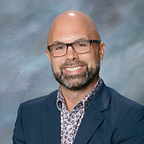Model That Metacognition
Three reflective questions can support a lifetime of authentic learning.
Education is waking up to the power of self-reflection. It seems that when we ask our learners to actually reflect on their own learning journeys, very cool things happen.
They get involved in the process. They take on some agency and assume some ownership. They move from passive spectators to active participants.
And the results can be significant.
Ironically, teachers can fall into the role of passive spectator as well. We can find ourselves waiting to be taught by others. To be professionally developed. To be told our next steps forward.
Yes, it’s entirely possible for the very professionals dedicated to the industry of learning to learn very little at all. To cruise from year to year. To grow stagnant and stale, uncritical of our own practices, unconcerned with growth, or too content in safety to risk uncertainty of any kind.
Don’t hear me heaping judgment, because I’ve been there myself. For those of us who’ve been around for a decade or two, professional complacency has a certain stealth about it. Turn your back on it for long, and before you know it, you’re comfortable.
But it’s hard to learn when you’re too comfortable.
Three Big Questions
Last year, I was privileged to attend an assessment conference with three colleagues. We were profoundly impacted.
One of the things we saw in the conference was the way that schools were using Three Big Questions to make learning visible throughout their entire buildings. It’s so simple, really.
- What am I learning right now?
- How’s it going?
- Where to next?
Students were involved, but teachers were too. And that gave me some big ideas for the 2019–2020 school year.
Student Self-Reflections on Seesaw
First, I decided to make these Three Big Questions a regular part of my classroom culture. In addition to other opportunities of self-reflection, I now ask my 8th grade students to reflect on these questions every Friday on Seesaw.
(*If you’re a Seesaw teacher yourself and would like to try this activity, grab it here.)
So far, I’ve allowed students to reflect on any learning target(s) from any subject, and I’m always impressed by how thoughtfully they approach this exercise.
It’s a simple practice. The writing demands here are pretty tame. It feels safe, and it’s interesting to my students. All they have to do is be honest.
Their comments are usually enlightening, and my eyes are always opened when I hear about their challenges, their frustrations, and the wins they’re celebrating.
It’s an awesome practice.
Teachers Can Reflect, Too
As a middle school, our staff team decided to begin the 2019–2020 school year by following the fantastic example at Holly Elementary in Ladner, BC, and building a bulletin board that modeled lifelong learning through the Big Three questions.
- What was something that we were learning? It didn’t need to be academic.
- How was that learning process going?
- Where were we headed next?
Three Big Questions in My PLN
Encouraged by this activity, I then threw out the Three Big Questions to my PLN. I tweeted a challenge to educators in my professional learning network to tell me about their own learning journeys.
I could go on with more examples, but you get the idea.
It was super fun, and an exercise that I think schools and learning communities everywhere would do well to build into their staff conversations, circle check-ins, and professional learning times.
Wouldn’t you want to know what your colleagues are learning? I find that so inspiring and energizing.
Back to You: Model That Metacognition
And so I leave the Big Three questions with you, lifelong learner and education professional.
- What are YOU learning right now?
- How is that going for you?
- Where are you headed next?
Share your answers with your own learners, with your colleagues, and with your PLN.
Because learning is contagious.
